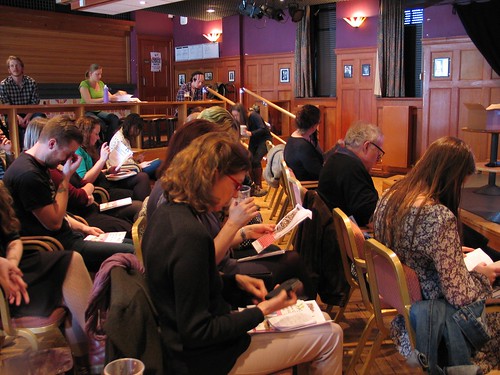
Last week, I was extremely flattered to be invited to speak at The Business, an event run by the University of Edinburgh and hosted by their Writer in Residence Jenni Fagan. The event was designed for budding writers who were keen to know more about the ‘business’ side of being a writer. I was asked to speak alongside publishing megastars like Francis Bickmore and Jenny Brown (!!!), and my topic was, essentially “is a Creative Writing PhD right for you?”
I think my talk went OK: the best part about it was definitely making my supervisor, Alan — who was hiding at the back of the room — blush quite a lot as I talked about what a brilliant mentor he’d been. But much better than my barely coherent ramblings were the talks of the other speakers. I hand-picked some useful advice from each of them for your reading pleasure…
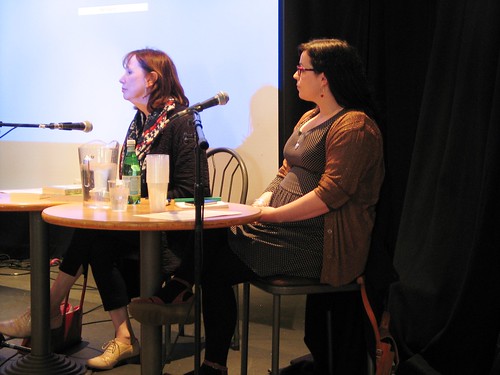
1. Jenny Brown of Jenny Brown Associates, literary agent:
“Don’t write to trends.”
I’ve seen Jenny Brown speak on many occasions, and she always manages to make her advice to writers fresh and relevant to what’s going on in the book world at that very moment. However, this piece of advice is always in there and I think it’s something a lot of young novelists (in particular) need to hear. “You can never get on top of a trend,” she says, “because by the time you get your novel out there, you’ll have just missed it.” Instead, she advises, you should concentrate on writing a great novel that you love, and that your agent will love. “I don’t pick books based on genre, or based on whether or not I think they will be commercially successful,” Jenny said. “I mean, those things are factors, but at the end of the day if I love your book, that’s the main thing. All the books I’ve picked to represent, I have loved.”
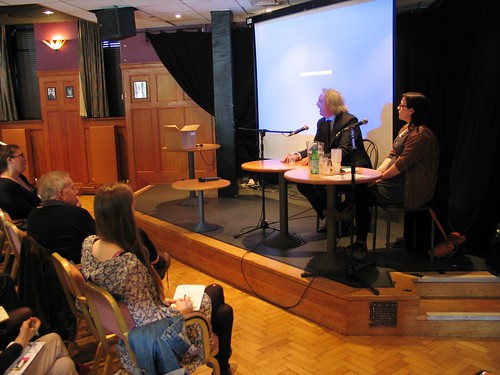
2. Chris Hamilton-Emery of Salt, publisher:
“We need more narrative non-fiction.”
Did you know that the market for non-fiction is far larger than the market for fiction? “Fiction is declining,” Chris revealed, and he picked up on a point that Jenny had made about her love of nature writing. “Jenny said she was disappointed not to see more nature books. I agree. I wish more young writers would break into non-fiction earlier.” He said that for every fifty novels that landed on his desk, he’d see only one non-fiction work. (He also mentioned poetry’s market share: less than 1% of the entire book market. But then, we knew that, right?)
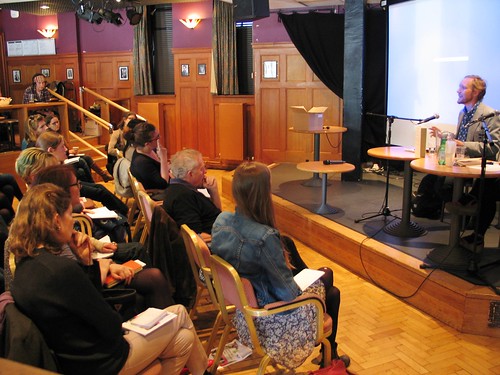
3. Francis Bickmore of Canongate, publisher:
“The hair shines with brushing.”
Francis gave his own seven rules for writers, all of which were great, but this was by far my favourite. He said it came from a friend of his, another publisher, who’d been listening to one of their writers moaning about how many edits they were needing to do on their novel. “The guy’s response was, ah yes, but the hair shines with brushing. The hair shines with brushing. I think it’s Flaubert or something, and it’s so true.” In other words, edit, edit, polish, edit, polish and then edit some more. Make your writing shine.
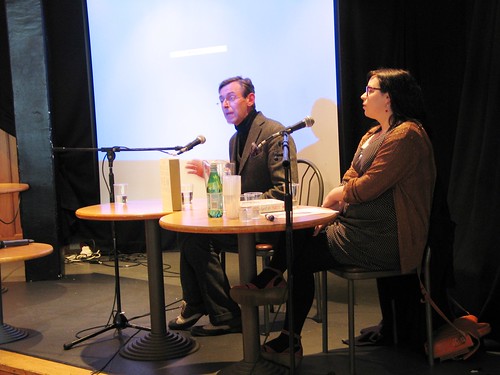
4. Stuart Kelly of The Guardian and many other places, critic:
“If you’re not interested in writing a novel that changes what the novel is capable of, get out of the business.”
This was probably my favourite piece of advice from the entire event. It’s something I might nick, except I’d replace the word ‘novel’ with ‘poem.’ What Stuart was saying is that the best novels are the ones that really push the boundaries of the form: one of the audience members gave the example of Jennifer Egan‘s Visit from the Goon Squad, which happens to be my favourite novel ever, and really does do what Stuart’s talking about. “It’s not enough to just mention Twitter here and there,” Stuart said. “I’m talking about really experimenting with what this form can do.”
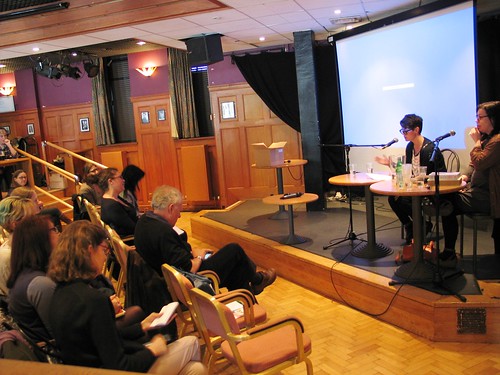
5. Peggy Hughes, of Dundee Book Festival, promoter:
“Perform your work in public.”
Peggy, aka the most-loved person in Scottish arts administration (no joke, she’s awesome) was in attendance to talk about the role of literary festivals in the writing business. She revealed that she routinely attends poetry readings, open mics and other literary events in order to scout for potential talent to book for her festival. “Go and read at these things,” she said. “You never know when someone like me might be sitting in the audience thinking, I should book this person.”
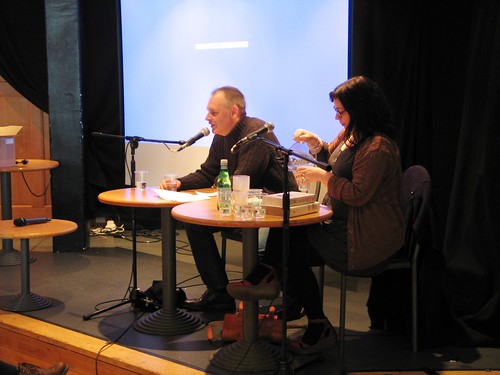
6. Kevin Williamson of Neu! Reekie!, promoter:
“Embrace the improbable.”
Kevin’s talk was mostly about his whirlwind experience at the helm of the Creative Scotland-funded cabaret sensation that is Neu! Reekie! He talked about having his face put on a new whisky brand’s label, meeting Richard Hell and somehow managing to get Primal Scream to play at one of his gigs. But it wasn’t just half an hour of how cool Kevin Williamson’s life is: he also talked about how rewarding community work can be for writers, talking a bit about his experiences teaching the poetry of Robert Burns in Scottish prisons. “All the things that have happened to me have been pretty improbable,” he said. “When Neu! Reekie! started we had no idea where it was going to go. So just embrace it, just go with whatever comes to you.”
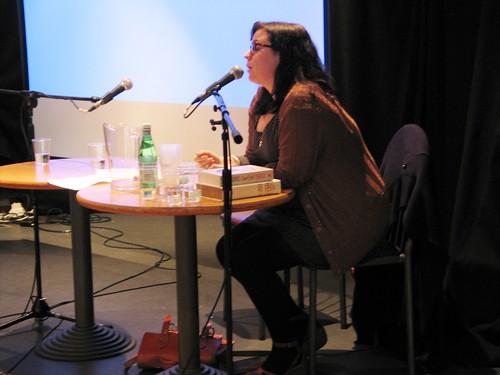
7. Jenni Fagan of the University of Edinburgh, writer:
“Pace yourself… and get off Facebook.”
Jenni is in the middle of developing her novel The Panopticon (which is good and you should read it, by the way) into a film script, so she fielded a lot of questions from the audience about that side of things. However, she warned that “98% of all films never get made,” and pushed the importance of focussing on the writing first and foremost. “I got off Facebook because I found that I was looking at things like the best way to peel a banana, and then from that I clicked on to a really cute photo of a koala bear… and then before I knew it I’d spent a whole hour and all I’d done was surf a bunch of crap.” She says writers ought to focus on removing anything from their lives “that takes you away from words,” but she also noted the value of pacing yourself, and knowing that everything does not happen at once. “I have this idea for another novel,” she said, “but I am pretty sure I won’t start writing it for maybe another five or ten years. You just have to let things take their course.”
Incidentally, if you have any questions about Creative Writing PhDs, keep an eye out for a post on the topic in the next little while!
*
Like shiny things? Check out Edinburgh Vintage, a totally unrelated ‘sister site’ full of jewels, treasures and trinkets. If you want to get in touch you can follow OneNightStanzas on Twitter, or email claire[at]onenightstanzas.com. I reply as swiftly as I can!









